#asian family systems in QLs
Explore tagged Tumblr posts
Note
Your post about your upcoming Bad Buddy meta got me thinking about Bad Buddy (again), and I remembered one particular thing that had an impact. Apologies if this is long and rather incoherent, I wrote this past midnight.
In the final episode, the part where we see Ming and Dissaya turn a blind eye to Pat Pran's shenanigans really struck a chord with me.
[I'm an Indian, born and raised, and queer, but it's well worth mentioning that my experiences are not universal- in fact, they may be the exception rather than the rule; I'm not quite sure.]
What it reminded me of was, that asian parents tend to come around eventually- in particular mothers. We've seen time and time again in series' that deal with difficult/not accepting family members; Bad Buddy, GAP, Wedding Plan, maybe even Double Savage (haven't watched this one but I believe the dad feels bad in the end?), that even if the parental figure(s) doesn't agree with their children's choices, they learn to compromise. Because the difference in opinions isn't worth losing their children over. Obviously, for every parental figure that comes around there's one that the children cut ties with (Wedding Plan remains a good example), but I think it's something worth seeing.
It made me think of how I was never scared of coming out to my mother, because I knew that, despite the difference in views, and her prejudice, she'd accept me, no matter whether she thought it was a phase or not.
Do I know what the point of this ask is? Not really, I was rather nervous sending this ask, especially not on anon, but I'd love to know what you think of this, since I've come to really enjoy reading the thoughts you have on these shows.
Ohhhh, wow. @starryalpacasstuff, come 'ere for a big mom hug! HUGE HUGS!
I'm gonna unwind a little randomly; I hope this is coherent. A ton of what I write about on my blog vis à vis Asian dramas are the unique characteristics of Asian families and an Asian upbringing. Parental conditional love, competitiveness, our unique experiences with intergenerational trauma. I write a lot about how Asians, in our cultural expectations of life, accept pain and suffering as an assumed part of our existences. The reason why I watch Asian dramas exclusively is that, as I'm Asian-American, I just connect far more easily to the Asian cultural experience of growing from a child into an Asian adult, than I do the experience of white Western folks growing into their adulthood. I grew up intimately with Asian cultural practices and expectations; but I also grew up with racism in my external American world, and came to my adulthood in a society that still values white Americans above all other demographics.
But one thing I'm cognizant of, that I don't think I write about enough, is that many of these characteristics of the Asian cultural scopes of life are indeed similar to those that a fully American person (for example) might experience. It's not like intergenerational trauma doesn't exist in the West. It's not like homophobia in families against a child doesn't exist in the West.
However. As an Asian-American, one thing I note about many (not all, of course) Western families and family systems is that very often: Western adults will give up their agency to be loyal to what I might call a "higher power" -- a philosophy, a political preference, a religion. If a queer person wants to come out in a conservative American family, that queer person may very well be risking cutting permanent ties with their family.
That, of course, also happens in our Asian family systems. But I think you're onto something, @starryalpacasstuff. While divorce rates are sky-high in the West -- there is also a paradigm of family systems being and looking different in the West than they do in Asia. Asian family systems still don't accommodate for divorce and blended or chosen families as they do in the West.
The Asian family systems and paradigms that you and I grew up with as Indians absolutely still value a heterosexual two-parent household -- and I'd posit that our past generations, our grandparents and great-grandparents, put HUGE, HUGE pressure on our parents to keep the two-parent family systems together and whole. And to keep the children close. It's a huge value in our Asian cultures to have whole and complete families. The West has become far more accommodating, culturally, on this issue.
And, so. I totally agree with you, @starryalpacasstuff. I think we do see the beginning of a coming-around on the parts of Ming and Dissaya. And that coming-around is certainly something we can relate to. Our parents will likely accept us for our differences. I fucked a lot of shit up with my folks when I decided to live independently of their desires -- and I don't think things really healed (and I still carry tremendous traumatic baggage) until after I had my own kids, and expanded all of our families. Because in the end, the value in our Asian cultures is that keeping the family complete and close still matters more than any one's individual biases or desires.
Ming and Dissaya are remarkably traumatized people. Ming was traumatized by the expectations of his father. He screwed Dissaya over, and literally handed his trauma to Pat on a silver platter, for Pat to embody for most of his life. And Pat flipped that platter over in his father's face and ran away. Ming, at the end of the series, is passive-aggressive with Pat, despite Pat's efforts to try to work with him. And yet -- Ming still sips Pran's scotch.
To your point -- does time heal everything? I'm not so sure in the West, with the Western predilection for Christian/Puritanical/conservative values to supersede reasonable family resolutions. But I think, because of the value that Asian systems put on having complete families, that you are right -- that there may be more room in Asian family systems for eventual acceptance of a child's "differences," despite us living in collectivist societies. This is definitely not an absolute. There are environments in which it's still dangerous to come out. But the value that Asians put on family does indeed give us a tiny bit of comfort that our cultures can move the needle on acceptance in different ways over time.
#thank you for the ask!#the father in double savage does indeed come around#there's so much to think about here#and it's hard to talk in generalities#but i really think it's important that asian dramas about queer experiences show all facets of acceptance and rejection by asian parents#like i appreciated seeing the discriminating father in i feel you linger in the air#because back in that time discrimination was far more common#i think acceptance is growing and growing across asia#we still have conservative asian societies#but as our parents become more familiar with minority demographics#and as WE have our children and teach them about equity#over time#certainly the needle of acceptance will be moved#asian family systems#asian family systems in BLs#asian family systems in QLs#bad buddy#bad buddy meta#bad buddy the series#bad buddy the series meta
38 notes
·
View notes
Text
Turtles Catches Up With the Essential BLs: Bad Buddy Edition
[The Reasons and Gratitude: While QL has exploded in volume over the last half-decade, I’ve been juggling a career with making and feeding babies. Now that my kids are bigger, I��m catching up on the essential QL dramas. Big ups to @absolutebl’s encyclopedic lists that I use for reference, as well as the recommendations of many dear mutuals. For the Bad Buddy recommendation, I thank my forever darling, @the-nihongo-adventure! Thank you for reading my reviews of shows you’ve already watched! REALLY LONG POST COMING: caveat emptor.]
I’ve been thinking for days on how I should start this review. Bad Buddy has waylaid me with an emotional brutality (in a good way!) that I haven’t been able to shake for weeks. Couple that with a speedy education in the ways of Aof Noppharnach through Moonlight Chicken, and well, my middle-aged heart has taken a lot.
Before I dive in, I’d like to quickly cite the amazing @emotionallychargedtowel, who referenced Murray Bowen’s family systems theory in a post about pursuer-distancer couplings. Family systems theory posits that human behavior is shaped by the structure of the family unit as a complex social system. In other words: through spoken, unspoken, assumed, and expected demands, instincts, boundaries, and pulls/pushes, humans as individuals are conditioned to interact in society vis à vis how they learned to interact with others through their familial upbringings.
Why do I bring this up in regards to Bad Buddy? I haven’t even begun to plummet the sheer depth of analysis about BBS on Tumblr (I’m deeply impressed by the volumes of analysis by my new dear mutual, @telomeke-bbs, whose posts served as wonderful references while I was watching the show), so if I’m repeating popular analysis, I apologize.
But for me, BBS was rooted first and foremost in a study of intergenerational trauma, and how our two UNBELIEVABLE protagonists, Pran and Pat, battled expected roles and boundaries from their families/family systems and friends to end up together.
I know now, through Moonlight Chicken, that Aof is an utter master at layering themes together. To be honest, I don’t think I’ve ever seen anything like it.
And I want to say upfront that while I want to be an objective reviewer of this show, I absolutely cannot be. While I’m thinking about Aof’s mastery of studying intergenerational trauma through the lens of a QL drama, my heart aches, in passionate subjectivity, about how important his work is for young Asians watching it. I only can wish, as a first-generation child of immigrants from South and Southeast Asia, that I had been able to watch these shows when I was growing up. If I had seen Asians making shows about intergenerational trauma through an Asian lens, about very progressive topics like same-sex relationships in Asia -- I would have known that there was a world of support and shared experiences for the kind of intergenerational trauma that I and my friends faced, when we all were growing up, Asian in America and elsewhere.
This was a terribly long introduction to say that while many other themes percolated throughout Bad Buddy (in typical Aof fashion, as I’m now understanding), including school dynamics, Thai queer culture, unrequited love, familial acceptance of same-sex relationships, and more -- that for me, in a very biased way, I HAD to see this show through the lens of intergenerational trauma. This show helped me to have hope that generations of continental and diasporic Asians will be better able to fend off these pressures through the medium of drama art.
So. My thoughts on Bad Buddy are rooted in a lens of intergenerational trauma. But what I also picked up on, vis à vis the boundaries I mentioned earlier emanating out of families as complex social systems -- is that Aof threw in a little (actually a lot) of David Hegel’s thesis-antithesis-synthesis framework as well. This framework allows for the criss-crossing of boundaries to come to a unified resolution -- and good lord, Bad Buddy came to that conclusion so INCREDIBLY well. The Hegelian framework was the means by which, I think, Aof could explore tearing down the deep-rooted effects of intergenerational trauma on the Asian society depicted in BBS.
Throughout the entire show, Pran and Pat danced around boundaries. At least at the start of the show, they never dared to cross the line between the two garbage bins in the front of their houses. These boundaries had been CREATED by Pran’s and Pat’s parents. And the boys were taught from birth -- you cross that line, and bad things will happen. Don’t play with the boy next door. Don’t fall for the kids next door. So: don’t get caught in front of us.
But Pat and Pran crossed the boundaries BEHIND their houses, BEHIND the VERY watchful eyes of their families, starting at a young age, and keeping that boundary-breaking a secret. Pran crossed a significant boundary by saving Pa from drowning.
But then they went to the same university, and new boundaries formed, between their arch-rival faculties. Pat sees that pressure and acts within it, defending his engineering homies against Pran’s architecture friends.
We saw in the first episode that it would be Pat’s family that would be the first to begin breaking those boundaries as adults -- but it wasn’t Pat who began that work. It was Pa.
I’ve always found it interesting that it’s younger siblings who often have the “easiest” time breaking hard-set boundaries and family codes. I know, because I count in that category (and I know this is an overgeneralization, but just roll with me for a sec). Younger siblings see the shit their older counterparts -- parents, sibs, whoever -- create and deal with. And younger sibs then can develop better ways of managing the pressures that come from that shit. Myself included, I’ve often seen younger sibs be the first ones to marry in family units, to have children, to get jobs, to move away from home, etc. Younger siblings often have the ability to say NO more easily than their older family members. It’s, I think, a natural occurrence to take place in a family system of multiple siblings.
So it’s Pa who says to Pat: promise me you won’t hurt Pran. Right off the bat, she asks for a breaking of a boundary that Pat, his parents, and the engineering faculty homies want to uphold. And Pat, being devoted to his sister, agrees to the promise -- and the whole confused dance between him and Pran as adults begins.
I LOVED this. The show needed an immediate impetus to break what could have been a groaning, stereotypical Romeo-and-Romeo paradigm. This wasn’t going to end in mutual suicide -- hell no, not in a Thai BL. This drama needed to go places. As well, for me, I think Pa was set up to be an indirect foil to the pressures that Pran faces later in the series, simply by way of BEING in the form of a younger sibling.
The repeated theme during the first few episodes that I latched onto was Pran saying to Pat, “things don’t end well when I’m close to you.” In episode 1, Pat retorts -- “at least you won’t get transferred this time around.” In episode 4, Pran repeats himself, and guess what happens? He sees Pat with Ink, and experiences the repeated trauma of unintentional rejection at the hands of Pat.
So, Pran feels like he’s learning his lesson, time and time again. He’s thinking -- I like Pat, I can’t help but like Pat. But my parents might be right. Bad things happen when this dude is around. My heart gets broken.
What’s the difference between Pran and Pat here? Pat can exist more carefree, open, instinctual. He can like people more openly. He can be honest with his feelings. WHY? Because he had a family support system while he was growing up that allowed him to take risks -- because he had a sibling, because he was the eldest son -- because he knew, through his family structure, that despite his behavior, that his family would be there for him. He was simply raised differently, in part because his family was slightly bigger, and his family had LESS to lose if they potentially lost Pat to a lifetime of disapproval. Pat can take risks, because he’ll still have Pa, even if he loses his parents.
When I think about Pran, through the lens of intergenerational trauma, I go back to the family systems theory. While I was talking about younger siblings earlier, Pran’s a totally different story. He’s an only child. He IS the BRUNT of the familial pressure to conform to everything his family wants him to be. He was raised that way, and no one can help it, if the family unit is a triad. If Pran disappears from his family because of their disapproval -- not only do they NOT have a son, but Pran HIMSELF doesn’t have a family. He has far more to lose. He feels he can’t take risks.
I am sure there’s reams of analysis about how understandable Pran’s reaction to his first kiss with Pat was. But I took his walk away from Pat to be that recognition. Pran simply could not believe in a future with Pat -- no way. Pran would lose everything he knew.
Hegel’s framework? This is Pran’s thesis: while I love Pat, I can’t have Pat, because if I have Pat, I’m crossing a boundary that should never be crossed. My world will fall apart. I need to walk away and deny that that kiss ever happened.
And what’s the antithesis here? I think, at this moment in the series, the antithesis IS Pat. It’s Pat’s queer revelation, and his ABILITY to just MOVE on his feelings. In just ONE EPISODE, y’all! In episode 5! SO FAST! (Come AWN, Pat, you WINNER, LOVE YOU.) But that’s Pat for you -- Pat, the antithesis of Pran, the guy who can move, because he has less to lose.
(Let me stop for a sec, stop the analyzing. THAT KISS. THE BEST EVER. NANON! OHM! COME AWN! AAAAHHHH!!!!)
So what does Pat do in episodes 6 and 7? He starts the first SYNTHESIS: he crosses that damn boundary and chases after his man. He goes to the zero-waste village, and -- as SO OFTEN happens in Hegelian thesis-based frameworks -- the guys go to the sea, to the water, to cross the water, to kickstart Pran’s antithesis to his life thesis, and to begin their synthesis together, their connection. (Remember Siddhartha by Hermann Hesse and crossing the river, woop woop!)
Like I said before -- not to be a huge fuckin’ nerd or anything, but whoops, too late -- I think the Hegelian framework allowed Aof to WRITE this script and leverage the familial boundary risks for the sake of the show. Because, as I wrote at length in my review of the Cherry Magic movie, taking these risks from the perspective of the Asian family unit is EEEENOOORMOUS. Legit, fam: Asian families WILL dump children. There is disowning. It happens. It’s KNOWN, in the backs of our minds, BAKED UNCONSCIOUSLY into our understanding of who we are as Asian individuals, that our families might give us up, because many of our families have overtly threatened it. Even if there isn’t active disowning, parents can passively judge you and be disappointed in you for the rest of your life, and you damn well know it.
Overgeneralization? Whatever you think. But I’ve experienced it. My friends have experienced it. Kurosawa knew it when he risks disownment to stay with Adachi in the Cherry Magic movie. I severely risked it when I, like, grew up -- when I wanted to date, to get engaged, to get married. I didn’t talk to certain family members for years. My siblings’ relationships were strained. All because I wasn’t falling in line with my family’s expectations for who I needed to be vis à vis THEIR expectations of me -- to stay home and let them dictate how to live my life (literally, not joking).
Instead of doing a typical Romeo-and-Romeo set-up, I think what Aof was doing here, by way of having Pat step out first to begin the boundary-breaking -- and we know now WHY Pat could do that, because of his family system ALLOWING him to be a person to take more risks -- is that he was demonstrating that positive change could happen, the trauma could be stopped, if the guys created family between each other. AOF IS SAYING: I’M GOING TO PROVE THAT THEY CAN STOP THE TRAUMA TOGETHER. I’m crying right now.
And before I get further, another note about Aof’s brilliance. He allowed us to see HOW COMPLICATED Pran is, before the real boundary breaking began. He allowed us to SEE that Pran COULD MAYBE BE OKAY with taking a risk -- vis à vis Pran’s love for music. God, I was SO STRUCK in the scene when Pran is writing the high school song with Pat in episode 5.
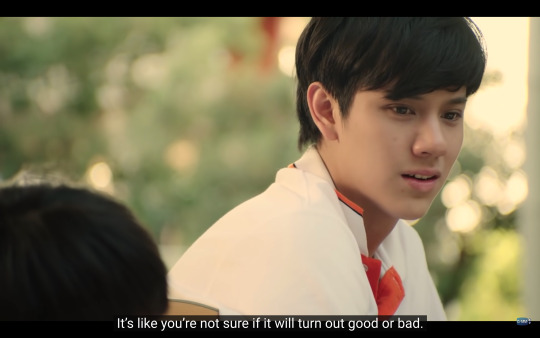
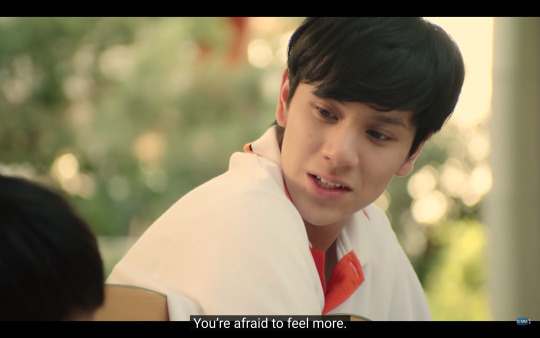
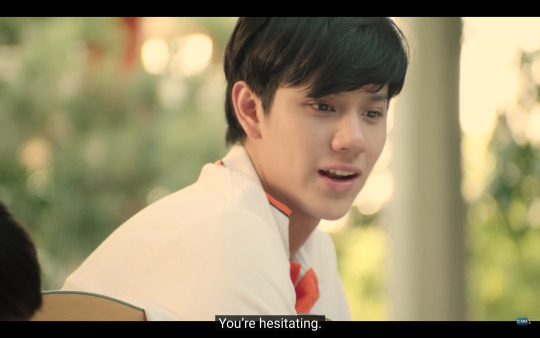

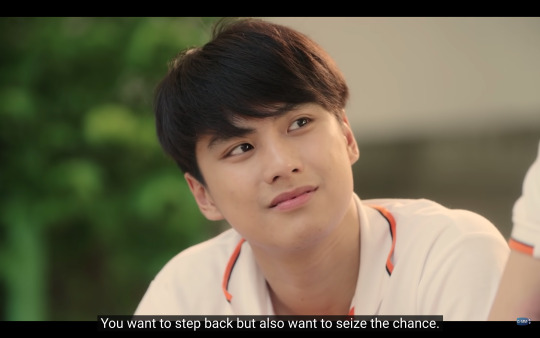
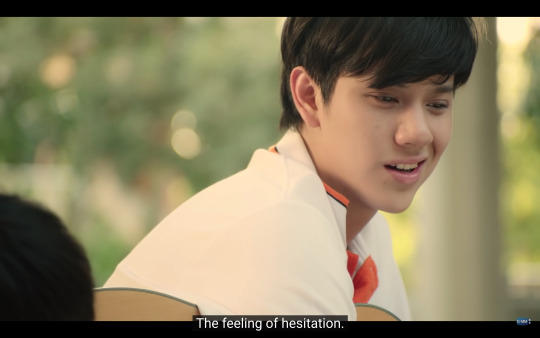
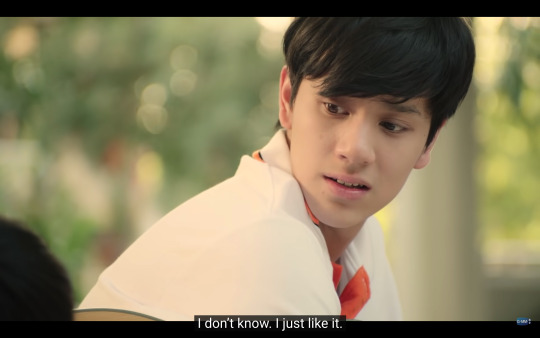
I think Pran’s not just talking about love here. I think, indirectly, he’s also talking about the risk of riling his family boundaries up.
(I want to note quickly that both Aof and Jojo Phukhaotong really leverage Nanon’s acting beautifully in these moments -- besides this music scene, there was Pran and Wai in the library talking about relationships and the school play, and in Dirty Laundry, Night meditates on music and love to a sleeping Neon. Nanon really nails this unwinding in his acting.)
I think Aof included these scenes of Pran meditating like this, because Pat couldn’t just hold Pran’s hand at the beach and sweep Pran away. That’s not how the Hegelian framework works. You gotta be ready, to be active, you gotta do the WORK, to reach enlightenment. The entire series shows Pran’s journey to acceptance about himself and about the fate he’ll have with Pat. We, as viewers, needed to see Pran be ready to do that. Sure, he has a forever crush on Pat. But we’ve now established the utterly enormous risks he faced -- more so than Pat ever needed to deal with -- if Pran’s family learned about Pran’s feelings, leanings, and ultimate decision to be with Pat.
We needed to hear, verbally, that Pran’s hesitation was real, that he was balancing in a very complicated way, all the risks he needed to consider. Maybe some people got frustrated at the high level of his complicated feelings, but I think the pace and plot made total sense. And, oh god -- the scene at the beach, where they touch hands and imagine a world where their parents aren’t fighting. Oh my god. AAAAAHHHH. Tears. Synthesis, baby, synthesis.
So then. The boundaries between the guys come down. They start getting kee-yoot. The games in episode 7, the help with the play in episode 8. It’s chef’s kiss, y’all.
But the boundaries come roaring back. The trauma resurfaces. Even while Pran contextualizes to Wai in the library -- “you can’t change the person or the time” when you fall in love -- what also doesn’t change is the world around them. The faculties still hate each other. Pat experiences familial rejection for the first time in his dad’s disappointment about the architecture play. The relationship is revealed. Wai rejects Pran. The seniors reject Pat.
(FAN BREAK: luv you, Aof, that gratuitous shirtlessness at the xylophone, LOVED IT, ::pointing to Aof::, LOVED IT.)
But. Episode 9 kicks in. Korn comes thru, MVP. (Yum, satay.) And I see something in Pran, when he approaches Pat at the bench at lunch.
I see Pran finally, truly, CROSSING HIS OWN LINE. Pran could have PANICKED at the revelation of their relationship to the school. He could have used it as an excuse to chicken out, to back away, again to cite that bad things happen when I get close to you, Pat.
But Pran didn’t do that. He holds Pat down, he steadies Pat. They hold each other down, because -- oh god, my chest is aching here, I’m tearing up -- in that moment, Pran’s recognizing that you need to be there for the family you’ve chosen and made. These are HIS NEW BOUNDARIES -- his new family system and unit. It’s his, and his alone.
Sure, we see in earlier episodes that part of Pran’s love language is nurturing, through cooking for Pat (and sometimes Pa, too, omg so cute), and that he learned that at the hands of his mother. But I saw something different in that simple scene at the lunch bench, after Pat got rejected by his seniors. I saw Pran’s confirmation that he was going to stick the landing of the synthesis, once and for all. That was when he wasn’t going to use any other excuse, ever again, to walk away from Pat, as others had begun to do to Pat.
And then we get the last three brilliant, BRILLIANT episodes of this already brilliant series. Let me set this up, because I think the way Aof did this, as yuzh, was incredible:
Episode 10: There are too many things about episode 10 to list in this already enormous post. I may have to write a separate post about how I think episode 10 was one of the greatest single episodes of a drama I’ve ever watched (the penultimate episode of Extraordinary Attorney Woo also comes to mind).
In any case, the Hegelian framework comes roaring back. We’re nearing the end of the series, and we need to remember as to why we’re here, and how we got to this point. The episode served as a major reminder of Pran’s original thesis -- we learn the reason why the families were at war. We learn that the demands of the separation came from Ming and Dissaya. The boys come out to their folks. The truth of Ming and Dissaya come out.
We learn that Ming himself is a product of MAJOR INTERGENERATIONAL TRAUMA, from his father, so much so that he fucked up a major opportunity for Dissaya. Trauma on trauma on trauma. (Seriously relatable for almost all Asians with pressurized parents.)
And Pran -- PRAN -- TELLS HIS MOTHER, TO HER FACE, that it was HER traumatizing HIM that led HIM to be the way he IS. At the end of this episode, before he rejoins Pat, he finally confronts his mother, and begins his holistic antithesis for the final time.
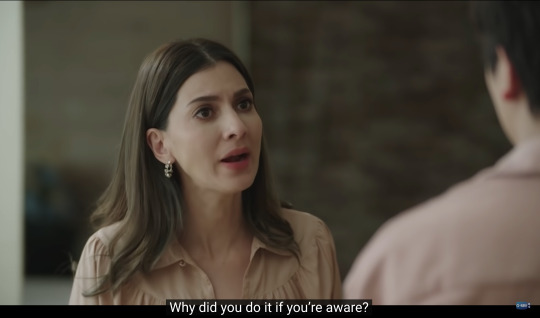
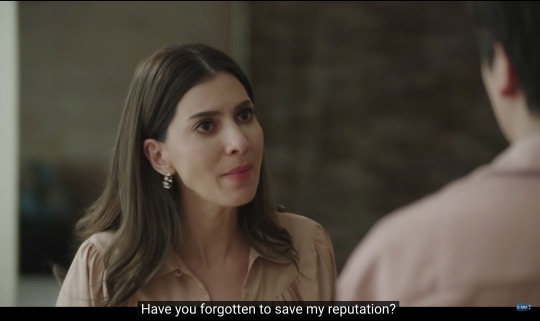
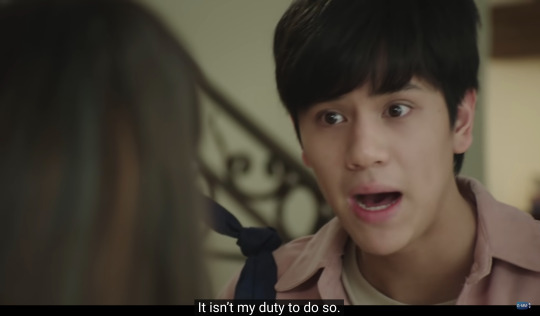
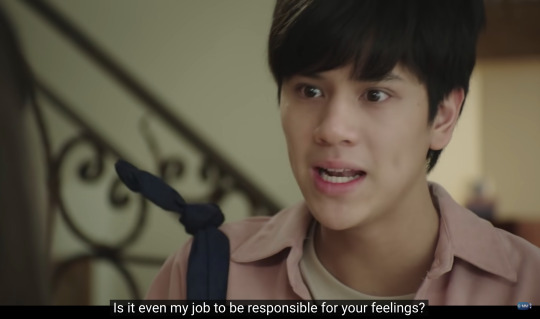
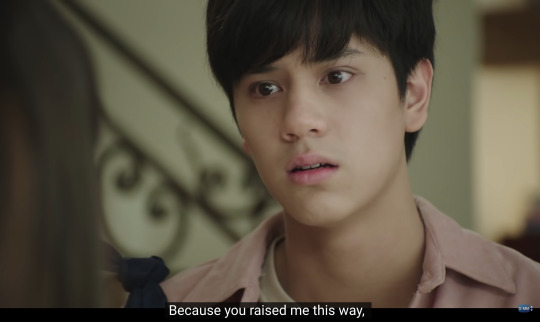
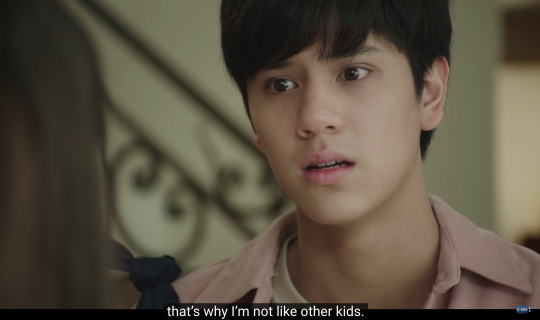
The boys come back together at the end of the episode, and weep, and embrace. And Pat says: we’re getting the fuck out of here.
(Now’s a good time to link to a meme on intergenerational trauma that my cousins in SE Asia shared with me around the end of 2021 -- interesting timing that this was floating around the WhatsApps and LINEs of that period.)
Episode 11: Leaving. Antithesis. The sea. Crossing boundaries. Living their lives together.
Oh my god, my aching heart. Pat spending most of the episode insisting that they were going to live together, forever, in the village. The antithesis to their lives in Bangkok. Pran knowing better. Pat knowing it, too.
The fact that until the very last minute, the entire episode was spent in the village, meant SO MUCH TO ME. This episode gave the guys TIME to process THEMSELVES, and their decisions. Oh lord, tears on tears.
And: what did the guys do? THEY COMMITTED TO EACH OTHER. CREATING THEIR FAMILY TOGETHER. They were going to do it THEIR WAY -- and, AND, AND -- BREAK THE CHAIN OF TRAUMA that they both faced, as assigned and influenced by their parents, by leveraging their new family unit TOGETHER.
And who helped give them that oomph, that power? Who helped them get context to see that that work was WORTH DOING -- even if it wouldn’t end up changing their families?
Uncle Tong. The boys got to see that through Uncle Tong.
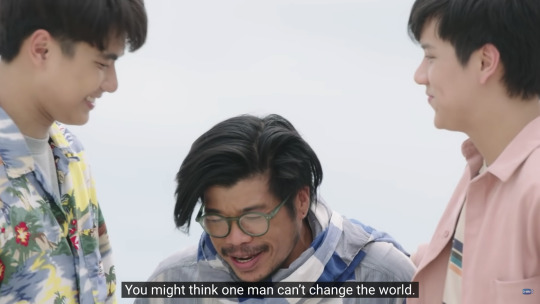
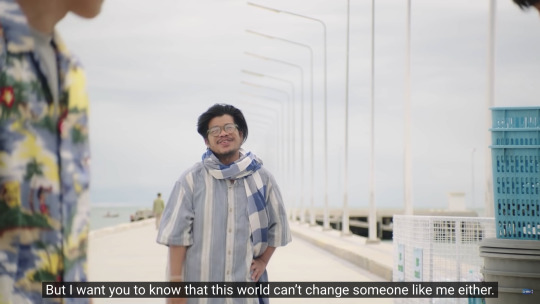
They got to see that one individual, or two individuals together, can’t change the world. The boys learned, indirectly, that they can’t change the world of their parents. But they can improve THEIR OWN WORLD.
Episode 12: SYNTHESIS.
When I was perusing the BBS tags for analysis, something I read piqued my interest: that the boys had to remain closeted to their families and friends.
I wouldn’t call it closeted. Instead, I want to guess what Aof was doing here.
I truly think Aof was showing compassion to the parental generation. It’s not the parents’ faults that they themselves were products of intergenerational trauma (peep the meme from earlier).
For me -- I’m an adult now, but I still carry the scars of my childhood -- I was disappointed not to see a bigger family resolution during my first watch of episode 12. But after a careful rewatch, I think Aof was being majorly realistic in his writing. These families weren’t going to come together in a finale, let alone in a day, let alone after DECADES of fighting.
Intergenerational trauma has to stop somewhere if you’re cognizant of it, and Pran and Pat’s parents weren’t cognizant of it. But: the guys certainly were. As we saw in the shots above, Pran himself CALLED OUT his mom for it in episode 10.
So I think I understand why Aof didn’t make a sparkling, holistically accepting ending out of this, because -- it was unrealistic. Ming and Dissaya still carry THEIR scars, and THEY need time to heal, too.
Their partners -- Pran’s dad and Pat’s mom -- are more ready for that change. They’re getting slightly caught up in the winds of change. Hell, even Pat’s mom says, “We are the adults” in episode 10 to Ming. Like Pa, Pat’s mom is demonstrating a little gentle nudge towards changing HER boundaries of the situation.
And the boys stated their stance at the end:
“Just like Uncle Tong said, we can’t change the world. All we could do was adjust to it, and live happily. We might not be able to change the people around us. BUT THEY COULDN’T CHANGE THE TWO OF US, EITHER.” [emphasis mine, obv]
I want to make one very last point that deeply touched my heart, and, I feel, confirms my theory about the boys making a new family unit together, complete with the boundaries of their choosing, and refusing to carry the trauma of their pasts. @telomeke-bbs wrote a lovely post, in part, about the meaning of Pran’s liquor gift to Ming. I totally agree with the analysis, and just wanted to add some cultural flavor.
Being an in-law in an Asian family structure means you show respect to your in-law elders. It’s just an unspoken, natural part of our being (and it helps if you like your in-laws). I’m married to a Westerner, but in many ways, I treat my Western in-laws with the same kind of respect as I would if they were Asian. So that means, I cook generously (they don’t expect me to do it, don’t worry -- I just like doing it, because it makes me feel like we’re family), and I serve up fine-ass cocktails (hell yeah). It’s fun, but it also makes me feel like I’m nurturing my extended family.
Pran gave the liquor gift to Ming, because....Ming is his family. Hey, Ming? Womp womp. You’ve got a son-in-law -- because Pran is taking on that role, despite your best efforts to reject that reality. And I see you, Ming, slowly, slowly, slowly begin to imagine that reality when you took a sip.
The reality is that when the boys became family to each other, they indirectly adopted each other’s families as their own -- because that’s just what happens in a relationship. And the liquor gift confirmed that. My heart SWELLED when Pran gave the gift to Pat, and I saw the duty-free bags in Pat’s family’s living room. How many times have I seen that scene in my life, when fam came back to visit from overseas -- scores of times. It meant so much. I’m going to bring a piece of overseas back to my family, even if my family, my in-laws, reject me. Maturity, motherfuckas. My man, Pran. Best son-in-law.
Aof took SO MUCH of what Asians expect about how our lives should be lived in this show, and absolutely turned it on its head. His SCRUTINY at what keeps adults back, at how adults raise children -- and about how children can CHANGE PARADIGMS, through love and partnership -- is CRITICAL COMMENTARY for young Asians, and young people around the world.
Oh, man. Do I have any more words? I’m all written out. If you got this far, thank you. This show WILL BE required viewing for my kids when they’re older. I want them to see what intergenerational trauma means to their Asian heritage. I want them to CALL ME and my hubs OUT for it. And I want them to know how they can be so strong, like Pat and Pran, to change the trajectory of their lives for the better.
*Tagging @bengiyo by request. <3
#bad buddy#bad buddy the series#backaof noppharnach#turtles catches up with thai bls#turtles catches up with the essential BLs#nanon korapat#ohm pawat#ohmnanon#intergenerational trauma#intergenerational trauma in asian societies#intergenerational trauma in asian families#david hegel#bad buddy meta#bad buddy the series meta#patpran#pran x pat#pat x pran#pranpat#aof noppharnach
241 notes
·
View notes
Note
Yes, yes yes! Thank you so much for all this, you perfectly captured what I was thinking of when I first sent you this ask! My reason for watching asian qls is largely the same as yours, it's far more relatable than anything I could find in western media (and lets face it, indian media has a long way to go in this area- it's getting there, but...)
The point about divorce rates being so much lower in asian countries is so true- there's a mindset of, "let's pull it together for the kids". We often talk about how the collectivist society in asian countries harms us, but it's so worth remembering how it also keeps family together. I have friends that are out as gay, and though their parents don't exactly agree with it, they accept them.
And I think that's a big part of growing up asian, we've seen time and time again that compromise for the sake of your family is ingrained into our very being; but maybe it's not so bad if our family is willing to compromise too. When you grow up in a largely homophobic society, you learn to accept that most of your friends and family will likely never fully accept and understand you. But they do try to meet us in the middle, and well, it has to be enough.
Your post about your upcoming Bad Buddy meta got me thinking about Bad Buddy (again), and I remembered one particular thing that had an impact. Apologies if this is long and rather incoherent, I wrote this past midnight.
In the final episode, the part where we see Ming and Dissaya turn a blind eye to Pat Pran's shenanigans really struck a chord with me.
[I'm an Indian, born and raised, and queer, but it's well worth mentioning that my experiences are not universal- in fact, they may be the exception rather than the rule; I'm not quite sure.]
What it reminded me of was, that asian parents tend to come around eventually- in particular mothers. We've seen time and time again in series' that deal with difficult/not accepting family members; Bad Buddy, GAP, Wedding Plan, maybe even Double Savage (haven't watched this one but I believe the dad feels bad in the end?), that even if the parental figure(s) doesn't agree with their children's choices, they learn to compromise. Because the difference in opinions isn't worth losing their children over. Obviously, for every parental figure that comes around there's one that the children cut ties with (Wedding Plan remains a good example), but I think it's something worth seeing.
It made me think of how I was never scared of coming out to my mother, because I knew that, despite the difference in views, and her prejudice, she'd accept me, no matter whether she thought it was a phase or not.
Do I know what the point of this ask is? Not really, I was rather nervous sending this ask, especially not on anon, but I'd love to know what you think of this, since I've come to really enjoy reading the thoughts you have on these shows.
Ohhhh, wow. @starryalpacasstuff, come 'ere for a big mom hug! HUGE HUGS!
I'm gonna unwind a little randomly; I hope this is coherent. A ton of what I write about on my blog vis à vis Asian dramas are the unique characteristics of Asian families and an Asian upbringing. Parental conditional love, competitiveness, our unique experiences with intergenerational trauma. I write a lot about how Asians, in our cultural expectations of life, accept pain and suffering as an assumed part of our existences. The reason why I watch Asian dramas exclusively is that, as I'm Asian-American, I just connect far more easily to the Asian cultural experience of growing from a child into an Asian adult, than I do the experience of white Western folks growing into their adulthood. I grew up intimately with Asian cultural practices and expectations; but I also grew up with racism in my external American world, and came to my adulthood in a society that still values white Americans above all other demographics.
But one thing I'm cognizant of, that I don't think I write about enough, is that many of these characteristics of the Asian cultural scopes of life are indeed similar to those that a fully American person (for example) might experience. It's not like intergenerational trauma doesn't exist in the West. It's not like homophobia in families against a child doesn't exist in the West.
However. As an Asian-American, one thing I note about many (not all, of course) Western families and family systems is that very often: Western adults will give up their agency to be loyal to what I might call a "higher power" -- a philosophy, a political preference, a religion. If a queer person wants to come out in a conservative American family, that queer person may very well be risking cutting permanent ties with their family.
That, of course, also happens in our Asian family systems. But I think you're onto something, @starryalpacasstuff. While divorce rates are sky-high in the West -- there is also a paradigm of family systems being and looking different in the West than they do in Asia. Asian family systems still don't accommodate for divorce and blended or chosen families as they do in the West.
The Asian family systems and paradigms that you and I grew up with as Indians absolutely still value a heterosexual two-parent household -- and I'd posit that our past generations, our grandparents and great-grandparents, put HUGE, HUGE pressure on our parents to keep the two-parent family systems together and whole. And to keep the children close. It's a huge value in our Asian cultures to have whole and complete families. The West has become far more accommodating, culturally, on this issue.
And, so. I totally agree with you, @starryalpacasstuff. I think we do see the beginning of a coming-around on the parts of Ming and Dissaya. And that coming-around is certainly something we can relate to. Our parents will likely accept us for our differences. I fucked a lot of shit up with my folks when I decided to live independently of their desires -- and I don't think things really healed (and I still carry tremendous traumatic baggage) until after I had my own kids, and expanded all of our families. Because in the end, the value in our Asian cultures is that keeping the family complete and close still matters more than any one's individual biases or desires.
Ming and Dissaya are remarkably traumatized people. Ming was traumatized by the expectations of his father. He screwed Dissaya over, and literally handed his trauma to Pat on a silver platter, for Pat to embody for most of his life. And Pat flipped that platter over in his father's face and ran away. Ming, at the end of the series, is passive-aggressive with Pat, despite Pat's efforts to try to work with him. And yet -- Ming still sips Pran's scotch.
To your point -- does time heal everything? I'm not so sure in the West, with the Western predilection for Christian/Puritanical/conservative values to supersede reasonable family resolutions. But I think, because of the value that Asian systems put on having complete families, that you are right -- that there may be more room in Asian family systems for eventual acceptance of a child's "differences," despite us living in collectivist societies. This is definitely not an absolute. There are environments in which it's still dangerous to come out. But the value that Asians put on family does indeed give us a tiny bit of comfort that our cultures can move the needle on acceptance in different ways over time.
#thank you for this!#as always i loved everything#hugging you back#asian family systems#asian family systems in BLs#asian family systems in QLs#bad buddy#bad buddy meta
38 notes
·
View notes
Note
What an amazing response -- I LOVE this dialogue, @starryalpacasstuff. (And, OH, I wish Indian media could move as progressively on these topics as Japan, Korea, Thailand, Taiwan, and the Philippines have. I think @neuroticbookworm knows of some interesting Indian queer material that I need to check out, but the volume is certainly lower.)
I'm going to be writing about this down the road in my BBS series: the nature of secret-keeping in Asian societies, and how so much of our paradigm -- no matter if we're queer, straight, in-between -- is about not being open and/or honest with our families for the sake of their comfort. And I mean being honest about like, anything -- our dating, our grades, what our career hopes are. Asians just DON'T have the common paradigm or demand or expectation for direct conversation and communication like we have in the West. It's SOOOOO stressful for me to talk to my parents nowadays because I have to really THINK about how to construct a conversation that's not going to invite criticism, an invasion of privacy, 10 more dumb questions. I have to really think about how to protect myself, AND my listeners, when I'm engaging with my Asian family, and it's hella stressful.
Flip that on its head when I'm talking to my American spouse, and -- the conversation just flows, because I can be open about everything. I can be totally relaxed, and not think about how my conversation is going to impact anyone else by way of shaking cultural mores.
I wanna give you another huge mom hug, because I think you're incredibly brave for coming out to your folks. I know what a gigantic deal that is in our culture. I hope you're treating yourself with grace and empathy. <3
Your post about your upcoming Bad Buddy meta got me thinking about Bad Buddy (again), and I remembered one particular thing that had an impact. Apologies if this is long and rather incoherent, I wrote this past midnight.
In the final episode, the part where we see Ming and Dissaya turn a blind eye to Pat Pran's shenanigans really struck a chord with me.
[I'm an Indian, born and raised, and queer, but it's well worth mentioning that my experiences are not universal- in fact, they may be the exception rather than the rule; I'm not quite sure.]
What it reminded me of was, that asian parents tend to come around eventually- in particular mothers. We've seen time and time again in series' that deal with difficult/not accepting family members; Bad Buddy, GAP, Wedding Plan, maybe even Double Savage (haven't watched this one but I believe the dad feels bad in the end?), that even if the parental figure(s) doesn't agree with their children's choices, they learn to compromise. Because the difference in opinions isn't worth losing their children over. Obviously, for every parental figure that comes around there's one that the children cut ties with (Wedding Plan remains a good example), but I think it's something worth seeing.
It made me think of how I was never scared of coming out to my mother, because I knew that, despite the difference in views, and her prejudice, she'd accept me, no matter whether she thought it was a phase or not.
Do I know what the point of this ask is? Not really, I was rather nervous sending this ask, especially not on anon, but I'd love to know what you think of this, since I've come to really enjoy reading the thoughts you have on these shows.
Ohhhh, wow. @starryalpacasstuff, come 'ere for a big mom hug! HUGE HUGS!
I'm gonna unwind a little randomly; I hope this is coherent. A ton of what I write about on my blog vis à vis Asian dramas are the unique characteristics of Asian families and an Asian upbringing. Parental conditional love, competitiveness, our unique experiences with intergenerational trauma. I write a lot about how Asians, in our cultural expectations of life, accept pain and suffering as an assumed part of our existences. The reason why I watch Asian dramas exclusively is that, as I'm Asian-American, I just connect far more easily to the Asian cultural experience of growing from a child into an Asian adult, than I do the experience of white Western folks growing into their adulthood. I grew up intimately with Asian cultural practices and expectations; but I also grew up with racism in my external American world, and came to my adulthood in a society that still values white Americans above all other demographics.
But one thing I'm cognizant of, that I don't think I write about enough, is that many of these characteristics of the Asian cultural scopes of life are indeed similar to those that a fully American person (for example) might experience. It's not like intergenerational trauma doesn't exist in the West. It's not like homophobia in families against a child doesn't exist in the West.
However. As an Asian-American, one thing I note about many (not all, of course) Western families and family systems is that very often: Western adults will give up their agency to be loyal to what I might call a "higher power" -- a philosophy, a political preference, a religion. If a queer person wants to come out in a conservative American family, that queer person may very well be risking cutting permanent ties with their family.
That, of course, also happens in our Asian family systems. But I think you're onto something, @starryalpacasstuff. While divorce rates are sky-high in the West -- there is also a paradigm of family systems being and looking different in the West than they do in Asia. Asian family systems still don't accommodate for divorce and blended or chosen families as they do in the West.
The Asian family systems and paradigms that you and I grew up with as Indians absolutely still value a heterosexual two-parent household -- and I'd posit that our past generations, our grandparents and great-grandparents, put HUGE, HUGE pressure on our parents to keep the two-parent family systems together and whole. And to keep the children close. It's a huge value in our Asian cultures to have whole and complete families. The West has become far more accommodating, culturally, on this issue.
And, so. I totally agree with you, @starryalpacasstuff. I think we do see the beginning of a coming-around on the parts of Ming and Dissaya. And that coming-around is certainly something we can relate to. Our parents will likely accept us for our differences. I fucked a lot of shit up with my folks when I decided to live independently of their desires -- and I don't think things really healed (and I still carry tremendous traumatic baggage) until after I had my own kids, and expanded all of our families. Because in the end, the value in our Asian cultures is that keeping the family complete and close still matters more than any one's individual biases or desires.
Ming and Dissaya are remarkably traumatized people. Ming was traumatized by the expectations of his father. He screwed Dissaya over, and literally handed his trauma to Pat on a silver platter, for Pat to embody for most of his life. And Pat flipped that platter over in his father's face and ran away. Ming, at the end of the series, is passive-aggressive with Pat, despite Pat's efforts to try to work with him. And yet -- Ming still sips Pran's scotch.
To your point -- does time heal everything? I'm not so sure in the West, with the Western predilection for Christian/Puritanical/conservative values to supersede reasonable family resolutions. But I think, because of the value that Asian systems put on having complete families, that you are right -- that there may be more room in Asian family systems for eventual acceptance of a child's "differences," despite us living in collectivist societies. This is definitely not an absolute. There are environments in which it's still dangerous to come out. But the value that Asians put on family does indeed give us a tiny bit of comfort that our cultures can move the needle on acceptance in different ways over time.
#thanks for the ask!#living in asian societies is something i tell ya#asian family systems#asian family systems in QLs#asian family systems in BLs
38 notes
·
View notes
Note
Yep, I know that there's some indian queer media, and it's lower in volume simply because it's rarely watched, and even those who fo want to watch it have to do so in secrecy.
It's so true that you really need to think when speaking to asian parents and carefully craft the conversation so that it doesn’t invite uncomfortable questions. I may have lucked out with relatively open parents, but I've seen the way my friends have to talk to theirs, and yeah, it's incredibly different from what you'd see in the west.
Another thing struck me as I read this. I'm not quite sure I have a point with this, but here we go.
In Bad Buddy, Ming and Dissaya are selfish. To them, they're preserving their pride, and at first they don't really seem to realize that their actions have negative consequences for their sons. Once again, my experiences are in no way universal, but as I've grown up, I've had one thing drilled into my head by my parents- 'be selfish'. There's a notion of 'Look out for the interests of yourself and your family first, everyone else second. That's how you survive.'
To Ming and Dissaya, they're simply looking out for their own interests. They justify their actions till the last episode, because they truly believe that it's 'no harm, no foul'. Could it be Pat and Pran running off that jolts them back to reality? I think so. A child cutting off ties is practically unheard of in Indian society, and I'd be willing to bet it's similar in several asian countries. As we've discussed above (and seen in wedding plan) they're willing to meet their kids in the middle, for the fear of losing them. Pat may never get to sit at Pran's dining table and eat Dissaya's food, but Pat and Pran can be together.
Your post about your upcoming Bad Buddy meta got me thinking about Bad Buddy (again), and I remembered one particular thing that had an impact. Apologies if this is long and rather incoherent, I wrote this past midnight.
In the final episode, the part where we see Ming and Dissaya turn a blind eye to Pat Pran's shenanigans really struck a chord with me.
[I'm an Indian, born and raised, and queer, but it's well worth mentioning that my experiences are not universal- in fact, they may be the exception rather than the rule; I'm not quite sure.]
What it reminded me of was, that asian parents tend to come around eventually- in particular mothers. We've seen time and time again in series' that deal with difficult/not accepting family members; Bad Buddy, GAP, Wedding Plan, maybe even Double Savage (haven't watched this one but I believe the dad feels bad in the end?), that even if the parental figure(s) doesn't agree with their children's choices, they learn to compromise. Because the difference in opinions isn't worth losing their children over. Obviously, for every parental figure that comes around there's one that the children cut ties with (Wedding Plan remains a good example), but I think it's something worth seeing.
It made me think of how I was never scared of coming out to my mother, because I knew that, despite the difference in views, and her prejudice, she'd accept me, no matter whether she thought it was a phase or not.
Do I know what the point of this ask is? Not really, I was rather nervous sending this ask, especially not on anon, but I'd love to know what you think of this, since I've come to really enjoy reading the thoughts you have on these shows.
Ohhhh, wow. @starryalpacasstuff, come 'ere for a big mom hug! HUGE HUGS!
I'm gonna unwind a little randomly; I hope this is coherent. A ton of what I write about on my blog vis à vis Asian dramas are the unique characteristics of Asian families and an Asian upbringing. Parental conditional love, competitiveness, our unique experiences with intergenerational trauma. I write a lot about how Asians, in our cultural expectations of life, accept pain and suffering as an assumed part of our existences. The reason why I watch Asian dramas exclusively is that, as I'm Asian-American, I just connect far more easily to the Asian cultural experience of growing from a child into an Asian adult, than I do the experience of white Western folks growing into their adulthood. I grew up intimately with Asian cultural practices and expectations; but I also grew up with racism in my external American world, and came to my adulthood in a society that still values white Americans above all other demographics.
But one thing I'm cognizant of, that I don't think I write about enough, is that many of these characteristics of the Asian cultural scopes of life are indeed similar to those that a fully American person (for example) might experience. It's not like intergenerational trauma doesn't exist in the West. It's not like homophobia in families against a child doesn't exist in the West.
However. As an Asian-American, one thing I note about many (not all, of course) Western families and family systems is that very often: Western adults will give up their agency to be loyal to what I might call a "higher power" -- a philosophy, a political preference, a religion. If a queer person wants to come out in a conservative American family, that queer person may very well be risking cutting permanent ties with their family.
That, of course, also happens in our Asian family systems. But I think you're onto something, @starryalpacasstuff. While divorce rates are sky-high in the West -- there is also a paradigm of family systems being and looking different in the West than they do in Asia. Asian family systems still don't accommodate for divorce and blended or chosen families as they do in the West.
The Asian family systems and paradigms that you and I grew up with as Indians absolutely still value a heterosexual two-parent household -- and I'd posit that our past generations, our grandparents and great-grandparents, put HUGE, HUGE pressure on our parents to keep the two-parent family systems together and whole. And to keep the children close. It's a huge value in our Asian cultures to have whole and complete families. The West has become far more accommodating, culturally, on this issue.
And, so. I totally agree with you, @starryalpacasstuff. I think we do see the beginning of a coming-around on the parts of Ming and Dissaya. And that coming-around is certainly something we can relate to. Our parents will likely accept us for our differences. I fucked a lot of shit up with my folks when I decided to live independently of their desires -- and I don't think things really healed (and I still carry tremendous traumatic baggage) until after I had my own kids, and expanded all of our families. Because in the end, the value in our Asian cultures is that keeping the family complete and close still matters more than any one's individual biases or desires.
Ming and Dissaya are remarkably traumatized people. Ming was traumatized by the expectations of his father. He screwed Dissaya over, and literally handed his trauma to Pat on a silver platter, for Pat to embody for most of his life. And Pat flipped that platter over in his father's face and ran away. Ming, at the end of the series, is passive-aggressive with Pat, despite Pat's efforts to try to work with him. And yet -- Ming still sips Pran's scotch.
To your point -- does time heal everything? I'm not so sure in the West, with the Western predilection for Christian/Puritanical/conservative values to supersede reasonable family resolutions. But I think, because of the value that Asian systems put on having complete families, that you are right -- that there may be more room in Asian family systems for eventual acceptance of a child's "differences," despite us living in collectivist societies. This is definitely not an absolute. There are environments in which it's still dangerous to come out. But the value that Asians put on family does indeed give us a tiny bit of comfort that our cultures can move the needle on acceptance in different ways over time.
#living in asian societies is something i tell ya#<-you said it#asian family systems#asian family systems in QLs#bad buddy meta
38 notes
·
View notes